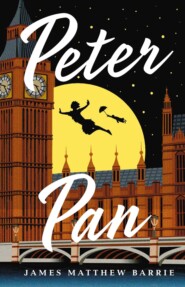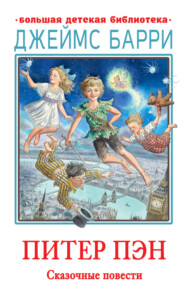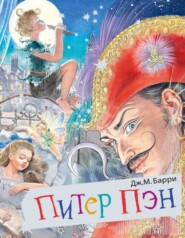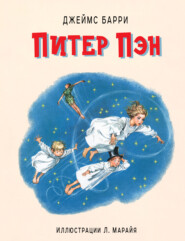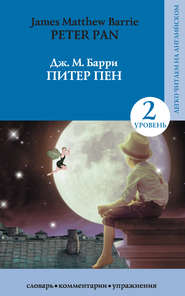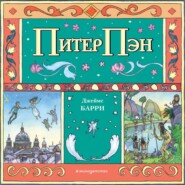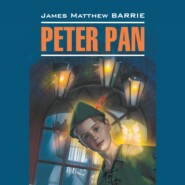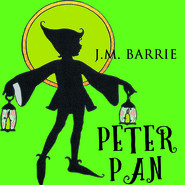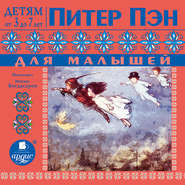По всем вопросам обращайтесь на: info@litportal.ru
(©) 2003-2024.
✖
The Little Minister
Настройки чтения
Размер шрифта
Высота строк
Поля
“Rintoul, I warn you your manner will betray you, and to-morrow it will be roared through the countryside that your bride ran away from the Spittal in a gypsy dress, and had to be brought back by force.”
The altercation may have lasted another minute, but the suddenness with which I learned Babbie’s secret had left my ears incapable of learning more. I daresay the two men started when they found me at my door, but they did not remember, as few do remember who have the noisy day to forget it in, how far the voice carries in the night.
They came as suddenly on me as I on them, for though they had given unintentional notice of their approach, I had lost sight of the speakers in their amazing words. Only a moment did young McKenzie’s anxiety to be spokesman give me to regard Lord Rintoul. I saw that he was a thin man and tall, straight in the figure, but his head began to sink into his shoulders and not very steady on them. His teeth had grip of his under-lip, as if this was a method of controlling his agitation, and he was opening and shutting his 261 hands restlessly. He had a dog with him which I was to meet again.
“Well met, Mr. Ogilvy,” said McKenzie, who knew me slightly, having once acted as judge at a cock-fight in the school-house. “We were afraid we should have to rouse you.”
“You will step inside?” I asked awkwardly, and while I spoke I was wondering how long it would be before the earl’s excitement broke out.
“It is not necessary,” McKenzie answered hurriedly. “My friend and I (this is Mr. McClure) have been caught in the mist without a lamp, and we thought you could perhaps favor us with one.”
“Unfortunately I have nothing of the kind,” I said, and the state of mind I was in is shown by my answering seriously.
“Then we must wish you a good-night and manage as best we can,” he said; and then before he could touch, with affected indifference, on the real object of their visit, the alarmed earl said angrily, “McKenzie, no more of this.”
“No more of this delay, do you mean, McClure?” asked McKenzie, and then, turning to me said, “By the way, Mr. Ogilvy, I think this is our second meeting to-night. I met you on the road a few hours ago with your wife. Or was it your daughter?”
“It was neither, Mr. McKenzie,” I answered, with the calmness of one not yet recovered from a shock. “It was a gypsy girl.”
“Where is she now?” cried Rintoul feverishly; but McKenzie, speaking loudly at the same time, tried to drown his interference as one obliterates writing by writing over it.
“A strange companion for a schoolmaster,” he said. “What became of her?”
“I left her near Caddam Wood,” I replied, “but she is probably not there now.”
“Ah, they are strange creatures, these gypsies!” he said, casting a warning look at the earl. “Now I wonder where she had been bound for.”
“There is a gypsy encampment on the hill,” I answered, though I cannot say why.
“She is there!” exclaimed Rintoul, and was done with me.
“I daresay,” McKenzie said indifferently. “However, it is nothing to us. Good-night, sir.”
The earl had started for the trap, but McKenzie’s salute reminded him of a forgotten courtesy, and, despite his agitation, he came back to apologize. I admired him for this. Then my thoughtlessness must needs mar all.
“Good-night, Mr. McKenzie,” I said. “Good-night, Lord Rintoul.”
I had addressed him by his real name. Never a turnip fell from a bumping, laden cart, and the driver more unconscious of it, than I that I had dropped that word. I re-entered the house, but had not reached my chair when McKenzie’s hand fell roughly on me, and I was swung round.
“Mr. Ogilvy,” he said, the more savagely I doubt not because his passions had been chained so long, “you know more than you would have us think. Beware, sir, of recognising that gypsy should you ever see her again in different attire. I advise you to have forgotten this night when you waken to-morrow morning.”
With a menacing gesture he left me, and I sank into a chair, glad to lose sight of the glowering eyes with which he had pinned me to the wall. I did not hear the trap cross the ford and renew its journey. When I looked out next, the night had fallen very dark, and the glen was so deathly in its drowsiness that I thought not even the cry of murder could tear its eyes open.
The earl and McKenzie would be some distance still 263 from the hill when the office-bearers had scoured it in vain for their minister. The gypsies, now dancing round their fires to music that, on ordinary occasions, Lang Tammas would have stopped by using his fists to the glory of God, had seen no minister, they said, and disbelieved in the existence of the mysterious Egyptian.
“Liars they are to trade,” Spens declared to his companions, “but now and again they speak truth, like a standing clock, and I’m beginning to think the minister’s lassie was invented in the square.”
“Not so,” said the precentor, “for we saw her oursel’s a short year syne, and Hendry Munn there allows there’s townsfolk that hae passed her in the glen mair recently.”
“I only allowed,” Hendry said cautiously, “that some sic talk had shot up sudden-like in the town. Them that pretends they saw her says that she joukit quick out o’ sicht.”
“Ay, and there’s another quirk in that,” responded the suspicious precentor.
“I’se uphaud the minister’s sitting in the manse in his slippers by this time,” Hendry said.
“I’m willing,” replied Whamond, “to gang back and speir, or to search Caddam next; but let the matter drop I winna, though I ken you’re a’ awid to be hame now.”
“And naturally,” retorted Tosh, “for the nicht’s coming on as black as pick, and by the time we’re at Caddam we’ll no even see the trees.”
Toward Caddam, nevertheless, they advanced, hearing nothing but a distant wind and the whish of their legs in the broom.
“Whaur’s John Spens?” Hendry said suddenly.
They turned back and found Spens rooted to the ground, as a boy becomes motionless when he thinks he is within arm’s reach of a nest and the bird sitting on the eggs.
“What do you see, man?” Hendry whispered.
“As sure as death,” answered Spens, awe-struck, “I felt a drap o’ rain.”
“It’s no rain we’re here to look for,” said the precentor.
“Peter Tosh,” cried Spens, “it was a drap! Oh, Peter! how are you looking at me so queer, Peter, when you should be thanking the Lord for the promise that’s in that drap?”
“Come away,” Whamond said, impatiently; but Spens answered, “No till I’ve offered up a prayer for the promise that’s in that drap. Peter Tosh, you’ve forgotten to take off your bonnet.”
“Think twice, John Spens,” gasped Tosh, “afore you pray for rain this nicht.”
The others thought him crazy, but he went on, with a catch in his voice:
“I felt a drap o’ rain mysel’, just afore it came on dark so hurried, and my first impulse was to wish that I could carry that drap about wi’ me and look at it. But, John Spens, when I looked up I saw sic a change running ower the sky that I thocht hell had taen the place o’ heaven, and that there was waterspouts gathering therein for the drowning o’ the world.”
“There’s no water in hell,” the precentor said grimly.
“Genesis ix.,” said Spens, “verses 8 to 17. Ay, but, Peter, you’ve startled me, and I’m thinking we should be stepping hame. Is that a licht?”
“It’ll be in Nanny Webster’s,” Hendry said, after they had all regarded the light.
“I never heard that Nanny needed a candle to licht her to her bed,” the precentor muttered.
“She was awa to meet Sanders the day as he came out o’ the Tilliedrum gaol,” Spens remembered, “and I daresay the licht means they’re hame again.”
“It’s well kent – ” began Hendry, and would have recalled his words.
“Hendry Munn,” cried the precentor, “if you hae minded onything that may help us, out wi’t.”
“I was just minding,” the kirk officer answered reluctantly, “that Nanny allows it’s Mr. Dishart that has been keeping her frae the poorhouse. You canna censure him for that, Tammas.”
“Can I no?” retorted Whamond. “What business has he to befriend a woman that belongs to another denomination? I’ll see to the bottom o’ that this nicht. Lads, follow me to Nanny’s, and dinna be surprised if we find baith the minister and the Egyptian there.”
The altercation may have lasted another minute, but the suddenness with which I learned Babbie’s secret had left my ears incapable of learning more. I daresay the two men started when they found me at my door, but they did not remember, as few do remember who have the noisy day to forget it in, how far the voice carries in the night.
They came as suddenly on me as I on them, for though they had given unintentional notice of their approach, I had lost sight of the speakers in their amazing words. Only a moment did young McKenzie’s anxiety to be spokesman give me to regard Lord Rintoul. I saw that he was a thin man and tall, straight in the figure, but his head began to sink into his shoulders and not very steady on them. His teeth had grip of his under-lip, as if this was a method of controlling his agitation, and he was opening and shutting his 261 hands restlessly. He had a dog with him which I was to meet again.
“Well met, Mr. Ogilvy,” said McKenzie, who knew me slightly, having once acted as judge at a cock-fight in the school-house. “We were afraid we should have to rouse you.”
“You will step inside?” I asked awkwardly, and while I spoke I was wondering how long it would be before the earl’s excitement broke out.
“It is not necessary,” McKenzie answered hurriedly. “My friend and I (this is Mr. McClure) have been caught in the mist without a lamp, and we thought you could perhaps favor us with one.”
“Unfortunately I have nothing of the kind,” I said, and the state of mind I was in is shown by my answering seriously.
“Then we must wish you a good-night and manage as best we can,” he said; and then before he could touch, with affected indifference, on the real object of their visit, the alarmed earl said angrily, “McKenzie, no more of this.”
“No more of this delay, do you mean, McClure?” asked McKenzie, and then, turning to me said, “By the way, Mr. Ogilvy, I think this is our second meeting to-night. I met you on the road a few hours ago with your wife. Or was it your daughter?”
“It was neither, Mr. McKenzie,” I answered, with the calmness of one not yet recovered from a shock. “It was a gypsy girl.”
“Where is she now?” cried Rintoul feverishly; but McKenzie, speaking loudly at the same time, tried to drown his interference as one obliterates writing by writing over it.
“A strange companion for a schoolmaster,” he said. “What became of her?”
“I left her near Caddam Wood,” I replied, “but she is probably not there now.”
“Ah, they are strange creatures, these gypsies!” he said, casting a warning look at the earl. “Now I wonder where she had been bound for.”
“There is a gypsy encampment on the hill,” I answered, though I cannot say why.
“She is there!” exclaimed Rintoul, and was done with me.
“I daresay,” McKenzie said indifferently. “However, it is nothing to us. Good-night, sir.”
The earl had started for the trap, but McKenzie’s salute reminded him of a forgotten courtesy, and, despite his agitation, he came back to apologize. I admired him for this. Then my thoughtlessness must needs mar all.
“Good-night, Mr. McKenzie,” I said. “Good-night, Lord Rintoul.”
I had addressed him by his real name. Never a turnip fell from a bumping, laden cart, and the driver more unconscious of it, than I that I had dropped that word. I re-entered the house, but had not reached my chair when McKenzie’s hand fell roughly on me, and I was swung round.
“Mr. Ogilvy,” he said, the more savagely I doubt not because his passions had been chained so long, “you know more than you would have us think. Beware, sir, of recognising that gypsy should you ever see her again in different attire. I advise you to have forgotten this night when you waken to-morrow morning.”
With a menacing gesture he left me, and I sank into a chair, glad to lose sight of the glowering eyes with which he had pinned me to the wall. I did not hear the trap cross the ford and renew its journey. When I looked out next, the night had fallen very dark, and the glen was so deathly in its drowsiness that I thought not even the cry of murder could tear its eyes open.
The earl and McKenzie would be some distance still 263 from the hill when the office-bearers had scoured it in vain for their minister. The gypsies, now dancing round their fires to music that, on ordinary occasions, Lang Tammas would have stopped by using his fists to the glory of God, had seen no minister, they said, and disbelieved in the existence of the mysterious Egyptian.
“Liars they are to trade,” Spens declared to his companions, “but now and again they speak truth, like a standing clock, and I’m beginning to think the minister’s lassie was invented in the square.”
“Not so,” said the precentor, “for we saw her oursel’s a short year syne, and Hendry Munn there allows there’s townsfolk that hae passed her in the glen mair recently.”
“I only allowed,” Hendry said cautiously, “that some sic talk had shot up sudden-like in the town. Them that pretends they saw her says that she joukit quick out o’ sicht.”
“Ay, and there’s another quirk in that,” responded the suspicious precentor.
“I’se uphaud the minister’s sitting in the manse in his slippers by this time,” Hendry said.
“I’m willing,” replied Whamond, “to gang back and speir, or to search Caddam next; but let the matter drop I winna, though I ken you’re a’ awid to be hame now.”
“And naturally,” retorted Tosh, “for the nicht’s coming on as black as pick, and by the time we’re at Caddam we’ll no even see the trees.”
Toward Caddam, nevertheless, they advanced, hearing nothing but a distant wind and the whish of their legs in the broom.
“Whaur’s John Spens?” Hendry said suddenly.
They turned back and found Spens rooted to the ground, as a boy becomes motionless when he thinks he is within arm’s reach of a nest and the bird sitting on the eggs.
“What do you see, man?” Hendry whispered.
“As sure as death,” answered Spens, awe-struck, “I felt a drap o’ rain.”
“It’s no rain we’re here to look for,” said the precentor.
“Peter Tosh,” cried Spens, “it was a drap! Oh, Peter! how are you looking at me so queer, Peter, when you should be thanking the Lord for the promise that’s in that drap?”
“Come away,” Whamond said, impatiently; but Spens answered, “No till I’ve offered up a prayer for the promise that’s in that drap. Peter Tosh, you’ve forgotten to take off your bonnet.”
“Think twice, John Spens,” gasped Tosh, “afore you pray for rain this nicht.”
The others thought him crazy, but he went on, with a catch in his voice:
“I felt a drap o’ rain mysel’, just afore it came on dark so hurried, and my first impulse was to wish that I could carry that drap about wi’ me and look at it. But, John Spens, when I looked up I saw sic a change running ower the sky that I thocht hell had taen the place o’ heaven, and that there was waterspouts gathering therein for the drowning o’ the world.”
“There’s no water in hell,” the precentor said grimly.
“Genesis ix.,” said Spens, “verses 8 to 17. Ay, but, Peter, you’ve startled me, and I’m thinking we should be stepping hame. Is that a licht?”
“It’ll be in Nanny Webster’s,” Hendry said, after they had all regarded the light.
“I never heard that Nanny needed a candle to licht her to her bed,” the precentor muttered.
“She was awa to meet Sanders the day as he came out o’ the Tilliedrum gaol,” Spens remembered, “and I daresay the licht means they’re hame again.”
“It’s well kent – ” began Hendry, and would have recalled his words.
“Hendry Munn,” cried the precentor, “if you hae minded onything that may help us, out wi’t.”
“I was just minding,” the kirk officer answered reluctantly, “that Nanny allows it’s Mr. Dishart that has been keeping her frae the poorhouse. You canna censure him for that, Tammas.”
“Can I no?” retorted Whamond. “What business has he to befriend a woman that belongs to another denomination? I’ll see to the bottom o’ that this nicht. Lads, follow me to Nanny’s, and dinna be surprised if we find baith the minister and the Egyptian there.”







